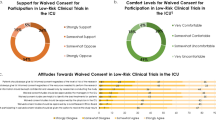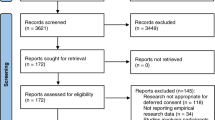Abstract
Background
Most critically ill patients are incapable of providing informed consent for research.
Objective
We sought to determine patients’ preferences for different consent frameworks for enrolling incapable patients into critical-care trials.
Design
Prospective observational and structured interview study.
Setting
Five university-affiliated hospitals in Ontario.
Patients
Two-hundred and forty consecutive capable and consenting survivors of critical illness.
Intervention
Participants considered four frameworks for enrolling incapable patients into clinical trials using a baseline scenario and three permutations for: risk (very low vs. high), treatment type (new vs. currently available), and availability of substitute decision-maker (yes vs. no).
Measurements and main results
For each scenario, patients chose their preferred framework and rated the acceptability of each framework using a seven-point Likert scale. Most (180/240; 76%) patients selected “consent by substitute prior to enrolment” as their preferred framework; this also received the highest baseline acceptability ratings (“acceptable” or “highly acceptable” 207/240; 87%). Modifying risk or treatment type did not substantially change these ratings. A minority of patients rated delayed consent as unacceptable or highly unacceptable in both the baseline scenario (48/240, 20% delayed to substitute; 57/240, 24% delayed to patient) and when a substitute was unavailable (34/240; 15%).
Conclusions
Most survivors of critical illness found the usual practice of obtaining informed consent from a substitute decision-maker prior to enrolment in a clinical trial to be acceptable. Nearly half of patients considered foregoing informed consent to be unacceptable, whereas a minority considered enrolment followed by delayed consent to be unacceptable even when a substitute was unavailable. These approaches should, therefore, only be considered when deviating from the usual practice of obtaining consent from a substitute decision-maker is truly justified, such as where treatments being tested need to be delivered as soon as possible in order to be effective.




Similar content being viewed by others
References
18th World Medical Association General Assembly (1964) World Medical Association Declaration of Helsinki: ethical principles for medical research involving human subjects. Helsinki, Finland
Annane D, Outin H, Fisch C, Bellissant E (2004) The effect of waiving consent on enrollment in a sepsis trial. Intensive Care Med 30:321–324
Anonymous (2007) Directive 2001/20/EC of the European Parliament and of the Council of 4 April 2001 on the approximation of the laws, regulations and administrative provisions of the member states relating to the implementation of good clinical practice in the conduct of clinical trials on medicinal products for human use. Off J Eur Communities, pp 33–44
Azoulay E, Pochard F, Chevret S, Adrie C, Bollaert PE, Brun F, Dreyfuss D, Goldgran-Toledano D, Garrouste-Orgeas M, Jourdain M, Wolff M, Le Gall JR, Schlemmer B (2003) Opinions about surrogate designation: a population survey in France. Crit Care Med 31:1711–1714
Bernard SA, Gray TW, Buist MD, Jones BM, Silvester W, Gutteridge G, Smith K (2002) Treatment of comatose survivors of out-of-hospital cardiac arrest with induced hypothermia. N Engl J Med 346:557–563
Bigatello LM, George E, Hurford WE (2003) Ethical considerations for research in critically ill patients. Crit Care Med 31:S178–S181
Biros MH, Lewis RJ, Olson CM, Runge JW, Cummins RO, Fost N (1995) Informed consent in emergency research. Consensus statement from the coalition conference of acute resuscitation and critical-care researchers. JAMA 273:1283–1287
Bowker AH (1948) A test for symmetry in contingency tables. J Am Stat Assoc 43:572–574
Ciroldi M, Cariou A, Adrie C, Annane D, Castelain V, Cohen Y, Delahaye A, Joly LM, Galliot R, Garrouste-Org M, Papazian L, Michel F, Barnes NK, Schlemmer B, Pochard F, Azoulay E (2007) Ability of family members to predict patient’s consent to critical-care research. Intensive Care Med 33:807–813
Cooper DJ, Myles PS, McDermott FT, Murray LJ, Laidlaw J, Cooper G, Tremayne AB, Bernard SS, Ponsford J (2004) Prehospital hypertonic saline resuscitation of patients with hypotension and severe traumatic brain injury: a randomized controlled trial. JAMA 291:1350–1357
Coppolino M, Ackerson L (2001) Do surrogate decision-makers provide accurate consent for intensive care research? Chest 119:603–612
Davis N, Pohlman A, Gehlbach B, Kress JP, McAtee J, Herlitz J, Hall J (2003) Improving the process of informed consent in the critically ill. JAMA 289:1963–1968
Emanuel EJ, Wendler D, Grady C (2000) What makes clinical research ethical? JAMA 283:2701–2711
Finfer S, Bellomo R, Boyce N, French J, Myburgh J, Norton R (2004) A comparison of albumin and saline for fluid resuscitation in the intensive-care unit. N Engl J Med 350:2247–2256
Fink MP, Suter PM (2006) The future of our specialty: critical care medicine a decade from now. Crit Care Med 34:1811–1816
Halperin H, Paradis N, Mosesso V Jr, Nichol G, Sayre M, Ornato JP, Gerardi M, Nadkarni VM, Berg R, Becker L, Siegler M, Collins M, Cairns CB, Biros MH, Vanden HT, Peberdy MA (2007) Recommendations for implementation of community consultation and public disclosure under the Food and Drug Administration’s “exception from informed consent requirements for emergency research”: a special report from the American Heart Association Emergency Cardiovascular Care Committee and Council on Cardiopulmonary, Perioperative and Critical Care: endorsed by the American College of Emergency Physicians and the Society for Academic Emergency Medicine. Circulation 116:1855–1863
Harvey SE, Elbourne D, Ashcroft J, Jones CM, Rowan K (2006) Informed consent in clinical trials in critical care: experience from the PAC-Man Study. Intensive Care Med 32:2020–2025
Health Canada (2003) Food and drug act, part C, division 5: good clinical practices. C.05.010
Kumar A, Roberts D, Wood KE, Light B, Parrillo JE, Sharma S, Suppes R, Feinstein D, Zanotti S, Taiberg L, Gurka D, Kumar A, Cheang M (2006) Duration of hypotension before initiation of effective antimicrobial therapy is the critical determinant of survival in human septic shock. Crit Care Med 34:1589–1596 (see comment)
Lemaire F (2006) The inability to consent in critical-care research: emergency or impairment of cognitive function? Intensive Care Med 32:1930–1932
Lemaire F (2006) The European Directive 2001/20 for clinical research: friend or foe? Intensive Care Med 32:1689–1690
Levine RJ (1995) Research in emergency situations. The role of deferred consent. JAMA 273:1300–1302
Lotjonen S (2002) Medical research in clinical emergency settings in Europe. J Med Ethics 28:183–187
Luce JM (2003) Is the concept of informed consent applicable to clinical research involving critically ill patients? Crit Care Med 31:S153–S160
Luce JM (2003) Research ethics and consent in the intensive-care unit. Curr Opin Crit Care 9:540–544
Luce JM, Cook DJ, Martin TR, Angus DC, Boushey HA, Curtis JR, Heffner JE, Lanken PN, Levy MM, Polite PY, Rocker GM, Truog RD (2004) The ethical conduct of clinical research involving critically ill patients in the United States and Canada: principles and recommendations. Am J Respir Crit Care Med 170:1375–1384
Luce JM (2003) California’s new law allowing surrogate consent for clinical research involving subjects with impaired decision-making capacity. Intensive Care Med 29:1024–1025
Magder S, Lefebvre A (2003) Obtaining consent for research studies on incompetent subjects: the Quebec experience. Intensive Care Med 29:496–498
McRae AD, Weijer C (2002) Lessons from everyday lives: a moral justification for acute care research. Crit Care Med 30:1146–1151
McRae AD, Weijer C (2002) Lessons from everyday lives: a moral justification for acute care research. Crit Care Med 30:1146–1151
Medical Research Council of Canada (2002) Tri-Council Policy Statement: ethical conduct for research involving humans, 1998 (with 2000, 2002 updates)
Muncie HL Jr, Magaziner J, Hebel JR, Warren JW (1997) Proxies’ decisions about clinical research participation for their charges. J Am Geriatr Soc 45:929–933
National Health and Medical Research Council, Australian Research Council, Australian Vice-Chancellor’s Committee (2007) National statement on ethical conduct in human research. Australian Government
Putensen C, Zech S, Wrigge H, Zinserling J, Stuber F, Von ST, Mutz N (2001) Long-term effects of spontaneous breathing during ventilatory support in patients with acute lung injury. Am J Respir Crit Care Med 164:43–49
Rivers E, Nguyen B, Havstad S, Ressler J, Muzzin A, Knoblich B, Peterson E, Tomlanovich M, Early Goal-Directed Therapy Collaborative Group (2001) Early goal-directed therapy in the treatment of severe sepsis and septic shock. N Engl J Med 345:1368–1377
Roberts I, Yates D, Sandercock P, Farrell B, Wasserberg J, Lomas G, Cottingham R, Svoboda P, Brayley N, Mazairac G, Laloe V, Munoz-Sanchez A, Arango M, Hartzenberg B, Khamis H, Yutthakasemsunt S, Komolafe E, Olldashi F, Yadav Y, Murillo-Cabezas F, Shakur H, Edwards P (2004) Effect of intravenous corticosteroids on death within 14 days in 10008 adults with clinically significant head injury (MRC CRASH trial): randomised placebo-controlled trial. Lancet 364:1321–1328
Seckler AB, Meier DE, Mulvihill M, Paris BE (1991) Substituted judgment: how accurate are proxy predictions? Ann Intern Med 115:92–98
Shalowitz DI, Garrett-Mayer E, Wendler D (2006) The accuracy of surrogate decision-makers: a systematic review. Arch Intern Med 166:493–497
Silverman HJ, Druml C, Lemaire F, Nelson R (2004) The European Union Directive and the protection of incapacitated subjects in research: an ethical analysis. Intensive Care Med 30:1723–1729
Smithline HA, Gerstle ML (1998) Waiver of informed consent: a survey of emergency medicine patients. Am J Emerg Med 16:90–91
Sulmasy DP, Haller K, Terry PB (1994) More talk, less paper: predicting the accuracy of substituted judgments. Am J Med 96:432–438
Sulmasy DP, Terry PB, Weisman CS, Miller DJ, Stallings RY, Vettese MA, Haller KB (1998) The accuracy of substituted judgments in patients with terminal diagnoses. Ann Intern Med 128:621–629
Truog RD, Robinson W, Randolph A, Morris A (1999) Is informed consent always necessary for randomized, controlled trials? N Engl J Med 340:804–807
Tu JV, Willison DJ, Silver FL, Fang J, Richards JA, Laupacis A, Kapral MK (2004) Impracticability of informed consent in the Registry of the Canadian Stroke Network. N Engl J Med 350:1414–1421
Veelo DP, Spronk PE, Kuiper MA, Korevaar JC, van der Voort PH, Schultz MJ (2006) A change in the Dutch directive on medical research involving human subjects strongly increases the number of eligible intensive care patients: an observational study. Intensive Care Med 32:1845–1850
Acknowledgments
We thank Mardi Baum, Katie L. Chapman, Greer Kirshenbaum B.Sc, Shelley Kraus B.Sc, Amanda Y. Li B.Sc, Kristina Lutz B.Sc, Jonathan S. Rosenberg B.Sc, Mohana Ratnapalan, Jasmine Soliven, and Ellen McDonald RN for assistance with data collection; Andrea Tkaczyk RN for preparing the research ethics application at St Joseph’s Healthcare; Helen Michalopoulous RN, and Michael Ward MD for input into initial discussions on study concept and design; and Sean P. Keenan, MD, M.Sc, Ellen McDonald RN, Donald A. Redelmeier, MD, and Roxanne Ward RN for critical revisions to earlier versions of this manuscript. This study was funded by grants from the Physicians’ Services Incorporated Foundation and the Canadian Intensive Care Foundation. None of the funding agencies had any role in the design and conduct of the study; collection, management, analysis, and interpretation of the data; or the preparation, review, and approval of the manuscript. Dr Scales served as a consultant for the Ontario Ministry of Health and Long-term Care Critical Care Strategy. Dr Friedrich is supported by a Canadian Institutes of Health Research Clinician Scientist Award. Dr Cook is a Research Chair of the Canadian Institutes of Health Research. Dr Ferguson is supported by a RCT Mentoring Program Award from the Canadian Institutes of Health Research. We also thank all the patients who consented to be interviewed for this study.
Conflict of interest statement
None of the authors has any conflict of interest to declare.
Author information
Authors and Affiliations
Corresponding author
Additional information
For the Canadian Critical Care Trials Group.
Electronic supplementary material
Below is the link to the electronic supplementary material.
Rights and permissions
About this article
Cite this article
Scales, D.C., Smith, O.M., Pinto, R. et al. Patients’ preferences for enrolment into critical-care trials. Intensive Care Med 35, 1703–1712 (2009). https://doi.org/10.1007/s00134-009-1552-y
Received:
Accepted:
Published:
Issue Date:
DOI: https://doi.org/10.1007/s00134-009-1552-y




